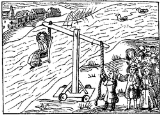
Ding Dong Bell
Encyclopedia
"Ding Dong Bell" or "Ding Dong Dell" is a popular English language
nursery rhyme
. It has a Roud Folk Song Index
number of 12853.
The phrase 'Ding, dong, bell' also appears several times in plays by Shakespeare. However, given the original of Shakespeare plays were in Quarto text and the majority were not published until 1623 in the First Folio
(seven years after his death), the following phrase could actually be the writer's original instructions for sound effects, although this is not certain. The relevant passages are:
The Tempest
, Act I, Scene II:
The Merchant of Venice
, Act III, Scene II:
The earliest version that resembles the modern one, with the additional lines that include (arguably) the more acceptable ending for children with the survival of the cat, is from Mother Goose's Melody published in London around 1765.
Several names are used for the malevolent Johnny Green, including Tommy O' Linne (1797) and Tommy Quin (c. 1840). Iona and Peter Opie suggested that it may have had its origins in Tom a lin or Tom o' Lin, the protagonist of another nursery rhyme.
English language
English is a West Germanic language that arose in the Anglo-Saxon kingdoms of England and spread into what was to become south-east Scotland under the influence of the Anglian medieval kingdom of Northumbria...
nursery rhyme
Nursery rhyme
The term nursery rhyme is used for "traditional" poems for young children in Britain and many other countries, but usage only dates from the 19th century and in North America the older ‘Mother Goose Rhymes’ is still often used.-Lullabies:...
. It has a Roud Folk Song Index
Roud Folk Song Index
The Roud Folk Song Index is a database of 300,000 references to over 21,600 songs that have been collected from oral tradition in the English language from all over the world...
number of 12853.
Lyrics
The most common modern version is:- Ding, dong, bell,
- Pussy’s in the well.
- Who put her in?
- Little Johnny Green.
- Who pulled her out?
- Little Tommy Stout.
- What a naughty boy was that,
- To try to drown poor pussy cat,
- Who ne’er did him any harm,
- But killed all the mice in the farmer's barn.
Origins
The earliest recorded reference to the rhyme is from John Lant, the organist of Winchester Cathedral in 1580, who recorded the following rhyme:Jacke boy, ho boy newes,
- the cat is in the well,
let us ring now for her Knell,
- ding dong ding dong Bell.
The phrase 'Ding, dong, bell' also appears several times in plays by Shakespeare. However, given the original of Shakespeare plays were in Quarto text and the majority were not published until 1623 in the First Folio
First Folio
Mr. William Shakespeares Comedies, Histories, & Tragedies. is the 1623 published collection of William Shakespeare's plays. Modern scholars commonly refer to it as the First Folio....
(seven years after his death), the following phrase could actually be the writer's original instructions for sound effects, although this is not certain. The relevant passages are:
The Tempest
The Tempest
The Tempest is a play by William Shakespeare, believed to have been written in 1610–11, and thought by many critics to be the last play that Shakespeare wrote alone. It is set on a remote island, where Prospero, the exiled Duke of Milan, plots to restore his daughter Miranda to her rightful place,...
, Act I, Scene II:
- "Sea nymphsOceanidIn Greek mythology and, later, Roman mythology, the Oceanids were the three thousand daughters of the Titans Oceanus and Tethys. Each was the patroness of a particular spring, river, sea, lake, pond, pasture, flower or cloud...
hourly ring his knell: - Hark! Now I hear them - Ding, dong, bell."
The Merchant of Venice
The Merchant of Venice
The Merchant of Venice is a tragic comedy by William Shakespeare, believed to have been written between 1596 and 1598. Though classified as a comedy in the First Folio and sharing certain aspects with Shakespeare's other romantic comedies, the play is perhaps most remembered for its dramatic...
, Act III, Scene II:
- "Let us all ring fancy's knell;
- I'll begin it - Ding, dong, bell."
The earliest version that resembles the modern one, with the additional lines that include (arguably) the more acceptable ending for children with the survival of the cat, is from Mother Goose's Melody published in London around 1765.
Several names are used for the malevolent Johnny Green, including Tommy O' Linne (1797) and Tommy Quin (c. 1840). Iona and Peter Opie suggested that it may have had its origins in Tom a lin or Tom o' Lin, the protagonist of another nursery rhyme.
Reformed versions
The most common modern version is arguably already a moderation of the theme of the original rhyme. The fear that children might be affected by the violence of the rhyme and specifically that children might be tempted to put cats in wells, led to several attempts to reform the rhyme. In his New Rhymes for Old (1949) Geoffrey Hall published the following alternative:- Ding dong bell,
- Pussy's at the well.
- Who took her there?
- Little Johnny Hare.
- Who'll bring her in?
- Little Tommy Thin.
- What a jolly boy was that
- To get some milk for pussy cat,
- Who ne'er did any harm,
- But played with the mice in his father's barn.

